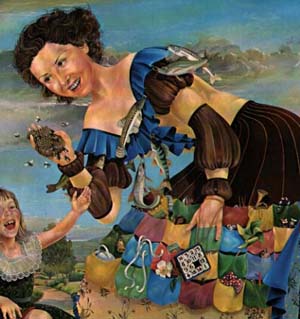Fred wanted to know what's wrong with the Diagnostic and Statistical Manual of Mental Disorders.
Instead of ranting in the comments section, I think I'll do it, in the words of Fritz Perls, in the HERE and NOW.
Now, here this:
Something wrong with the DSM?! Sheesh, nawwh. It's great reading and very useful if you want to be able to diagnose everyone you know with a mental illness. We all fit in there somewhere.
The DSM is basically a categorised list of symptoms. I don't even like to use the word 'symptoms' because that reeks of the whole medical model.
This is how the medical model works: If you fit one of the categories, then you must be 'sick'. Now, if you have diabetes, that is useful to know, because then you can go to a doctor, and the doctor can prescribe insulin, and you'll feel rather a lot better and you'll stop passing out.
But if you feel really sad, then you figure 'oh, I must be sick, I'd better go to a doctor'. So you go. And the doctor gives you some medicine, and if you take enough of it, you don't notice how sad you are anymore. Your father can ignore you for the rest of his life and you won't care.
Or if you get dignosed with schizophrenia, you take your medicine, you poor sick puppy, and you walk around feeling like you've got a vice clamped over your brain, and you don't have sex anymore, but at least you don't offend as many people.
What sucks about this is that:
(1) people believe the labels they're given and these labels stick (despite the fact that people who hear voices often just grow out of it as they get older, without any drugs or therapy at all)
(2) the book, and the whole medical/ pharmeceutical establishment that goes with it is making an obscene amount of money by making up these labels
(3) the labels in the book aren't even based on scientific reseaarch, they're created by political and market pressures
(4) the book reinforces society's notion that people must all conform to 'normal' as defined by the powerful
(5) the book reinforces the thought that a suffering person is a broken machine that can be tinkered with and fixed, rather than a hungry, sad, afraid, disconnected soul who needs vastly much more than a shot in the arm and a change of attitude.
Subscribe to:
Post Comments (Atom)

3 comments:
something tells me you are (or were) a psych student... or do you just have an unusually good general knowledge.
I agree with most of what you've written there, about society being overmedicated.
Moreover, I object to the way that, instead of celebrating differences in people, we seek to rectify them through medication and surgery.
Yeah. In the words of Quentin Crisp:
"Health consists in having the same diseases as one's neighbour."
Or "neighbours", you know.
Post a Comment